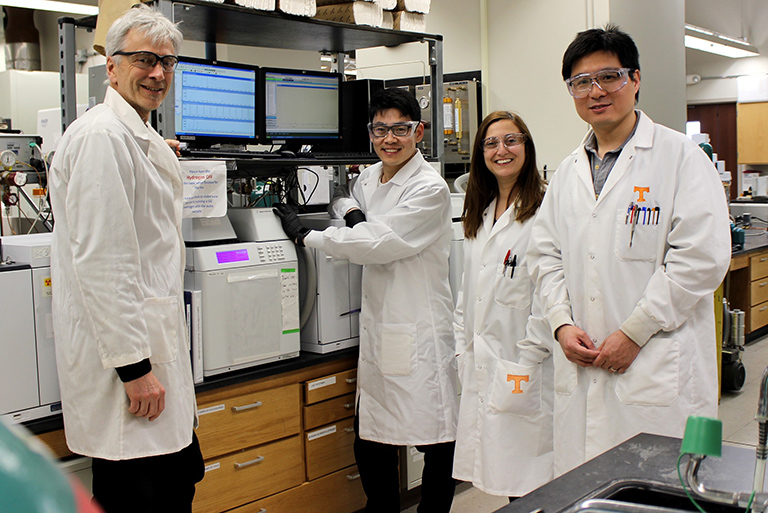
Researchers involved in the study were, from left, Frank Loeffler; Yongchao Yin; Fadime Kara Murdoch, PhD; and Gao Chen, PhD; in addition to Nina Pfisterer, who is not pictured.
Highlights
- Nitrous oxide (N2O) occurs in groundwater due to runoff.
- Loeffler’s team discovered any level of N2O slows the breakdown of toxins.
- Controlling agricultural runoff could improve outcomes.
- Related: Governor’s Chair Terry Hazen Develops New Water Testing
A new Superfund Research Program (SRP) study led by UT-ORNL Governor’s Chair Frank Loeffler shows that nitrous oxide (N2O), better known as laughing gas, commonly occurs in groundwater due to agricultural runoff and is responsible for inhibiting bacteria that breakdown toxic contaminants.
Bioremediation, the process of using microorganisms to degrade pollutants found in water and soil, has proven to be an effective in detoxifying some chlorinated organic pollutants. Essentially, the microorganisms gain energy for growth and reproduction by breaking the spring-like chemical bonds between atoms and stealing its electrons.
However, Loeffler and his team of researchers have recently discovered that reductive dechlorination, or the removal of chlorine atoms to turn contaminants into non-toxic substances, can be stalled even when there are low levels of N2O present.
For the study, the team measured the dechlorination rates of hazardous compounds such as tetrachloroethene (PCE), dichloroethene (cDCE), and vinyl chloride (VC) by bacteria used in bioremediation, specifically Dehalococcoides mccartyi and Geobacter lovleyi.
What they found was that even low concentrations of N2O can interfere with the enzymes that perform the dechlorination process, which can result in incomplete dechlorination. Loeffler and his team are continuing to explore how biological and geochemical conditions at a site can impact the reductive chlorination activity of the bacteria.
“Incomplete biodegradation of toxic chlorinated pollutants is often observed but it was not clear why” said Loeffler. “Our findings imply that N2O negatively impacts the bacterial detoxification process, and we need better control of agricultural fertilizer runoff to prevent undesirable consequences to precious drinking water resources.”
Since 1987, SRP, which is part of the National Institute of Environmental Health Sciences, has provided practical, scientific solutions to protect health, the environment, and communities. SRP funds grants on basic biological, environmental, and engineering processes to find real solutions to hazardous waste problems.
SRP also works to learn more about ways to protect the public from exposure to hazardous substances found in contaminated water, soil, and air at Superfund waste sites throughout the United States.
Read more about Loeffler’s research.
Contact
Élan Young: elan@tennessee.edu